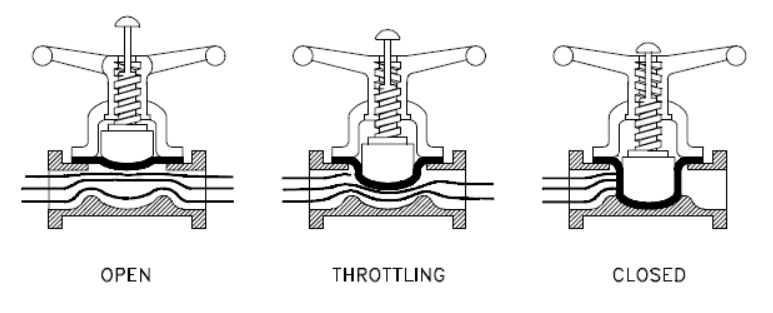Diaphragm control valves function through the movement of a flexible diaphragm, separating the fluid from the valve body. This diaphragm, manipulated by an actuator, regulates flow, ensuring precise control over fluid dynamics. Notably, the diaphragm's robust construction and seal integrity prevent leaks, ensuring operational safety and efficiency.

Varieties of Diaphragm Valves:
Diaphragm valves encompass various configurations, including weir, straight-way, and three-way designs. This article primarily focuses on the standard diaphragm valve, renowned for its compatibility across systems and ease of installation. Featuring a diaphragm smaller than the pipe diameter, it offers a cost-effective solution for fluid flow management.
Operational Dynamics:
Diaphragm valves operate via the displacement of the diaphragm, facilitating fluid passage or obstruction. When the diaphragm aligns with the flow direction, the valve permits flow; when perpendicular, it blocks flow, ensuring straightforward flow control.
Independent Flow Management:
Critical for many applications is the independent control of flow rates in different directions. Standard diaphragm valves excel in bidirectional flow control, achieved through diaphragm manipulation to regulate flow rates as needed.
Supply and Exhaust Applications:
Given their bidirectional flow control capability, diaphragm valves find utility in both supply and exhaust functions:
Diaphragm valves for supply manage fluid or gas influx into systems.
Diaphragm valves for exhaust regulate fluid or gas efflux from systems.
Diaphragm Valve on the Exhaust Side:
Controlling flow on the exhaust side proves advantageous in maintaining pressure balance within systems, thereby optimizing performance and efficiency.
Pressurization-Based Utilization:
Supply-side diaphragm valves find application in systems requiring precise flow control, notably in unidirectional flow setups such as hydraulic cylinders or systems with limited volumes.
In summary, diaphragm valves represent a cornerstone of fluid control systems, offering reliability and efficiency across diverse industries. With their robust design and tailored configurations, they address specific operational needs, ensuring optimal performance and system effectiveness.

